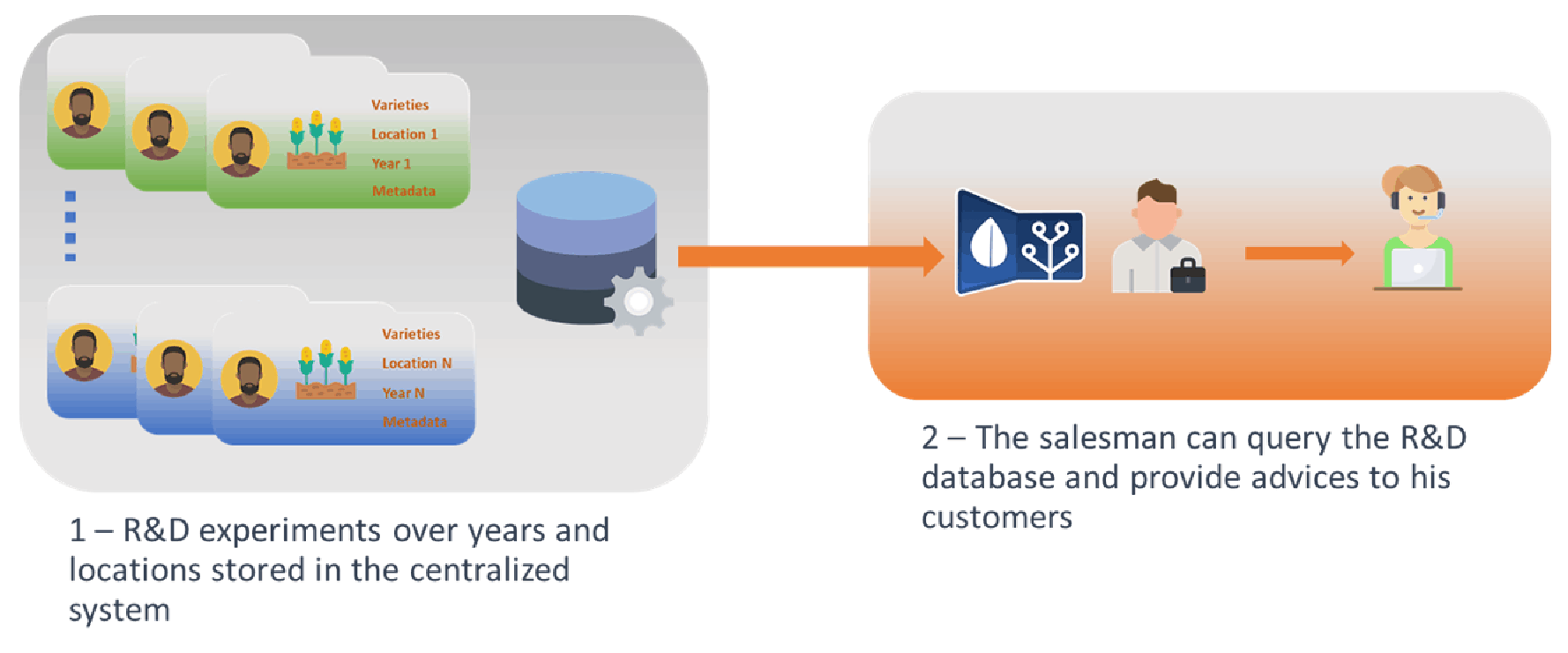January 5, 2022
•
5 min
read
Let's present below some tips and methods to avoid errors, stress and reach "Real Time" through 3 scenarios of efficient collaborative work:
Doriane's team is pleased to share with you its expertise from 30+ years of collaboration with plant R&D departments. We provide software and consulting services to plant breeding, agronomy and food research worldwide.
Learn more --->
Researchers share research information with other persons, or laboratories, inside or outside their organization.
Also, notably in life science, researchers need to take in account the life of the studied objects in the past, at least how have been produced these objects, or if apparented objects, like parents objects, have been studied in past years.
Now, once researcher is able to gather all these information on the life objects, from several experiments, and from experiment done in the past, he must verify the good quality of the data to make decision for the future.
To this aim, a user-friendly research software helps !

Best practices in the IT system management guarantee the efficience of data sharing, such as integrating cross-functional collaboration to your R&D.
A trial manager and a technician share information and collaborate in a data collection process thanks to RnDExp®:
The manager has access to all features of the trial management platform.
He prepares the trial network, sends data collection requirements and eventually asseses result reports.
The field technician only accesses the data collection interface.
He follows the instructions and sends back the data scored :

A common database and compatible processes enable collaborative work from nursery sample picking to analysis.
The breeder runs his plant breeding processes, he prepares the nurseries and requests analyses on a selection of progenies.
The lab technician only accesses the lab interface.
She follows the instructions, proceeds to the analyses and sends back the results.

Information from the research database is always sensible, usually secured in a digital safe.
An accurate right management along with best practices of research database structure enable to share information with third parties.
The sales department has much to gain in working together with the research department:
They access specific information such as variety and environment reports, web mapping of results... which helps much to produce the classical "Brochure report", including notably PCA statistics for agronomy.

The content of this article comes from a webinar presented by Rudy MEZINO, Agronomist and business engineer at Doriane®, with real case studies using RnDExperience®.


Webinar Replay
Next webinar
April 24, 2025
Unlock the power of multi-factorial trials! Learn from our agronomist and IT expert to design, test, and analyze interaction effects for smarter crop research.

Patricija Levickaite
IT expert & Agronomy engineer
January 5, 2022
•
5 min
read
Let's present below some tips and methods to avoid errors, stress and reach "Real Time" through 3 scenarios of efficient collaborative work:
Doriane's team is pleased to share with you its expertise from 30+ years of collaboration with plant R&D departments. We provide software and consulting services to plant breeding, agronomy and food research worldwide.
Learn more --->
Researchers share research information with other persons, or laboratories, inside or outside their organization.
Also, notably in life science, researchers need to take in account the life of the studied objects in the past, at least how have been produced these objects, or if apparented objects, like parents objects, have been studied in past years.
Now, once researcher is able to gather all these information on the life objects, from several experiments, and from experiment done in the past, he must verify the good quality of the data to make decision for the future.
To this aim, a user-friendly research software helps !

Best practices in the IT system management guarantee the efficience of data sharing, such as integrating cross-functional collaboration to your R&D.
A trial manager and a technician share information and collaborate in a data collection process thanks to RnDExp®:
The manager has access to all features of the trial management platform.
He prepares the trial network, sends data collection requirements and eventually asseses result reports.
The field technician only accesses the data collection interface.
He follows the instructions and sends back the data scored :

A common database and compatible processes enable collaborative work from nursery sample picking to analysis.
The breeder runs his plant breeding processes, he prepares the nurseries and requests analyses on a selection of progenies.
The lab technician only accesses the lab interface.
She follows the instructions, proceeds to the analyses and sends back the results.

Information from the research database is always sensible, usually secured in a digital safe.
An accurate right management along with best practices of research database structure enable to share information with third parties.
The sales department has much to gain in working together with the research department:
They access specific information such as variety and environment reports, web mapping of results... which helps much to produce the classical "Brochure report", including notably PCA statistics for agronomy.

The content of this article comes from a webinar presented by Rudy MEZINO, Agronomist and business engineer at Doriane®, with real case studies using RnDExperience®.
